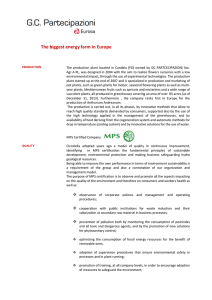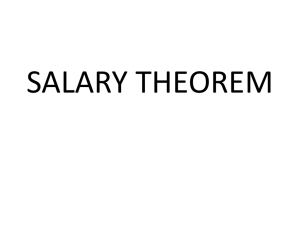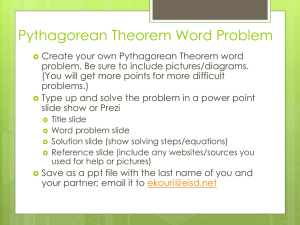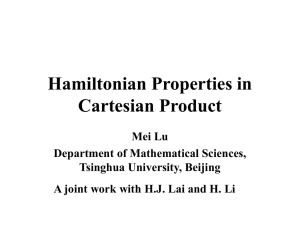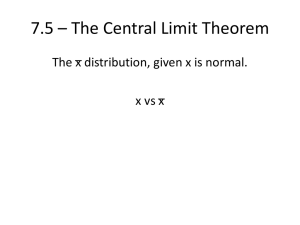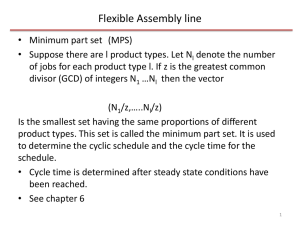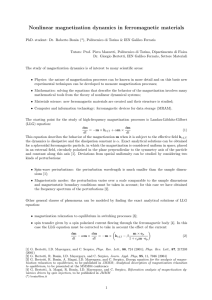MPS & PEPS as a Laboratory for Condensed Matter
advertisement
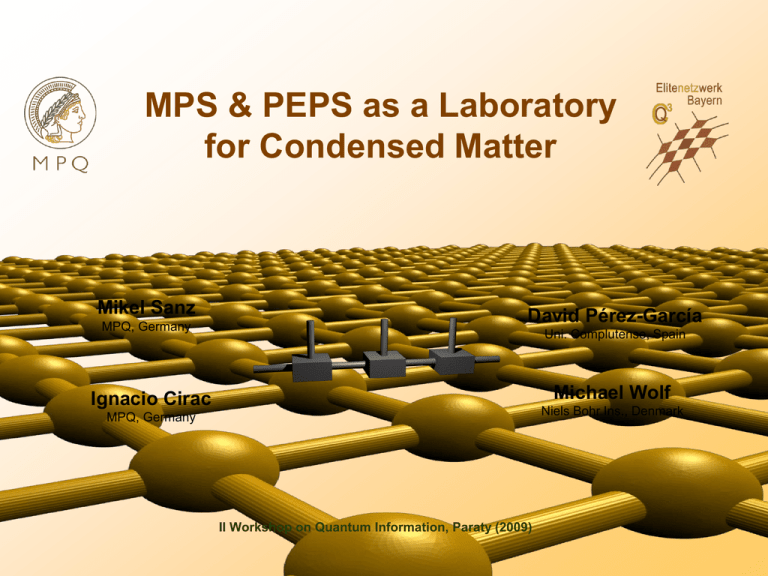
MPS & PEPS as a Laboratory for Condensed Matter Mikel Sanz MPQ, Germany David Pérez-García Uni. Complutense, Spain Michael Wolf Ignacio Cirac Niels Bohr Ins., Denmark MPQ, Germany II Workshop on Quantum Information, Paraty (2009) Outline I. Background 1. Review about MPS/PEPS • “Injectivity” 2. • 3. Definition, theorems and conjectures. Symmetries • II. What, why, how,… Definition and theorems Applications to Condensed Matter 1. Lieb-Schultz-Mattis (LSM) Theorem • 2. Theorem & proof, advantages. Oshikawa-Tamanaya-Affleck (GLSM) Theorem • 3. Theorem, fractional quantization of the magn., existence of plateaux. Magnetization vs Area Law • 4. Theorem, discussion about generality Others • String order Review of MPS General rank n d n MPS rank n D2 Non-critical short range interacting ham. Hamiltonians with a unique gapped GS Frustration-free hamiltonians Review of MPS Kraus Operators d Physical Dimension Bond Dimension D i A Cd CD CD D Translational Invariant (TI) MPS d tr A i1 i1 iN AiN i1 iN “Injectivity” Definition d Aii1 A i1 N if N : dim D , 1 tr A d X D 2 i1 i1 iN 1 AiN X i1 : M D C d N Injectivity! Are they general? INJECTIVE! iN 1 d i1 iNN i1 iN if N : rankN D2 Random MPS Set MPS iN “Injectivity” if N : rankN D2 Lemma rankN 1 D2 never lost! Injectivity reached h 0 Definition(Parent Hamiltonian) Assume ker k v i i1 q & is a ground state (GS) of i Translation Operator If injectivity is reached by blocking N spins & gap & exp. clustering , ai 0 H Ti h the Thm. h ai v i v i i1 q & kN Symmetries Definition ugN e iN g Thm. G a group u g & u g U g two representations of dimensions d & D e d A u e i g i i1 g ij i g U g A jU g Systematic Method to Compute SU(2) Two-Body Hamiltonians Density Matrix L tr A i1 Aj1 i1 AiL AjL i1 iL j1 j L L Hamiltonian 2s h 1 i j Eigenvectors n n 2 tr h tr h 0 2 aij Si S j Quadratic Form!! iL j1 jL Part II Applications to Condensed Matter Theory Lieb-Schulz-Mattis (LSM) Theorem Thm. The gap over the GS of an SU(2) TI Hamiltonian of a semi-integer spin vanishes in the thermodynamic limit as 1/N. Proof 1D 2D Thm. Lieb, Schulz & Mattis (1963) 52 pages Hasting (2004), Nachtergaele (2005) TI SU(2) invariance Uniqueness injectivity State EASY PROOF! for semi-integer spins Disadvantages Advantages Nothing about the gap Thm enunciated for states instead Hamiltonians Straightforwardly generalizable to 2D Detailed control over the conditions Oshikawa-Yamanaka-Affleck (GLSM) Theorem Thm. (1D General) SU(2) TI U(1) p - periodic ps m Z magnetization Fractional quantization of the magnetization Thm. (MPS) U(1) p - periodic MPS has magnetization ps m Z Advantages Again Hamiltonians to states Generalizable to 2D We can actually construct the examples Oshikawa-Yamanaka-Affleck (GLSM) Theorem m Example 10 particles HMG 2i i1 i i2 gap i Ground State h H H MG hS z p2 m0 Gapped system: General Scheme U(1)-invariant MPS With given p and m 0 H H0 hSz Parent Hamiltonian H 0 Magnetization vs Area Law Def. (Block Entropy) A trB S tr A log A Thm. (MPS) U(1) p - periodic magnetization m B A Thermodynamic limit such that T S logp m0 p log S log 1 2m Magnetization vs Area Law How general is this theorem? 6 particles Para ver esta película, debe disponer de QuickTime™ y de un descompresor . 8 particles Para ver esta película, debe disponer de QuickTime™ y de un descompresor . 7 particles Para ver esta película, debe disponer de QuickTime™ y de un descompresor . Theoretical Minimal Random States U(1) TI Spin 1/2 Block entropy L/2 - L/2 Thanks for your attention!! Finally…
